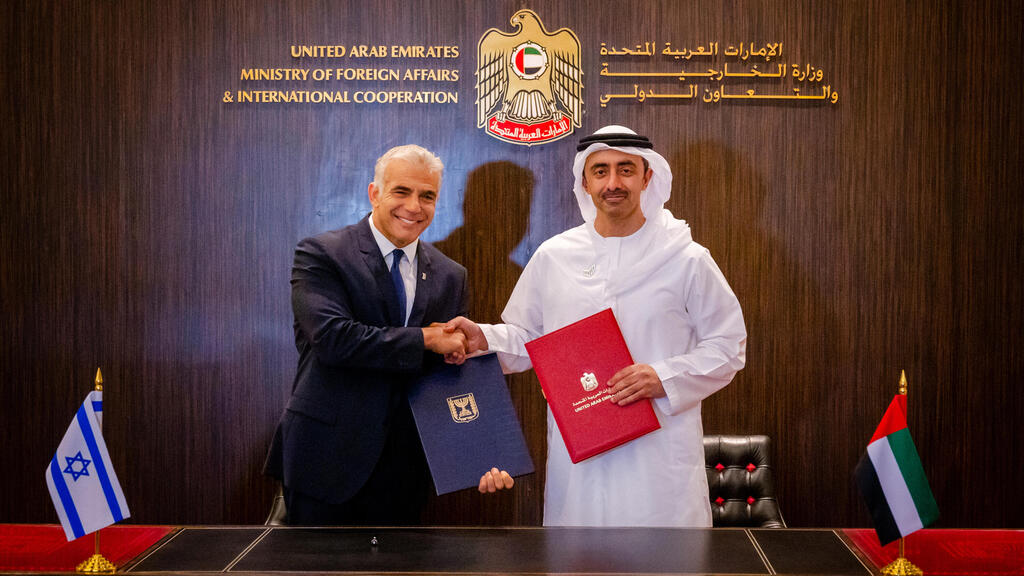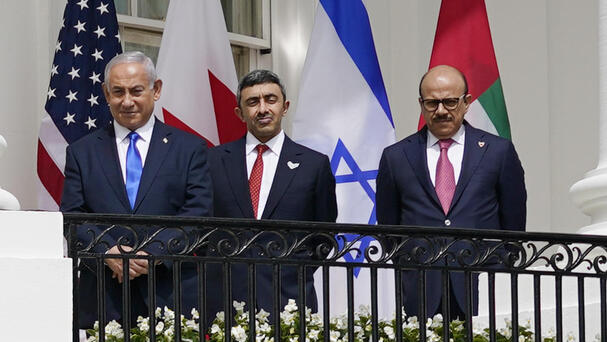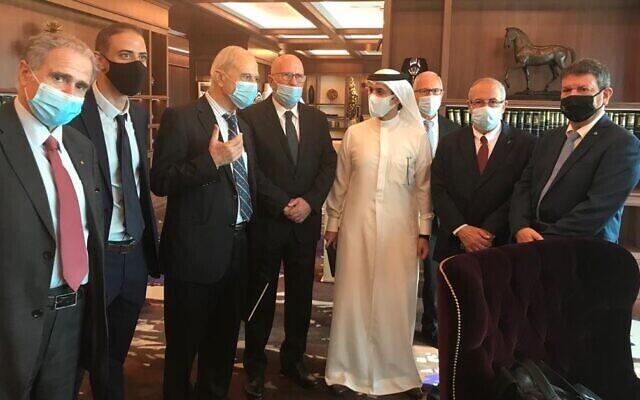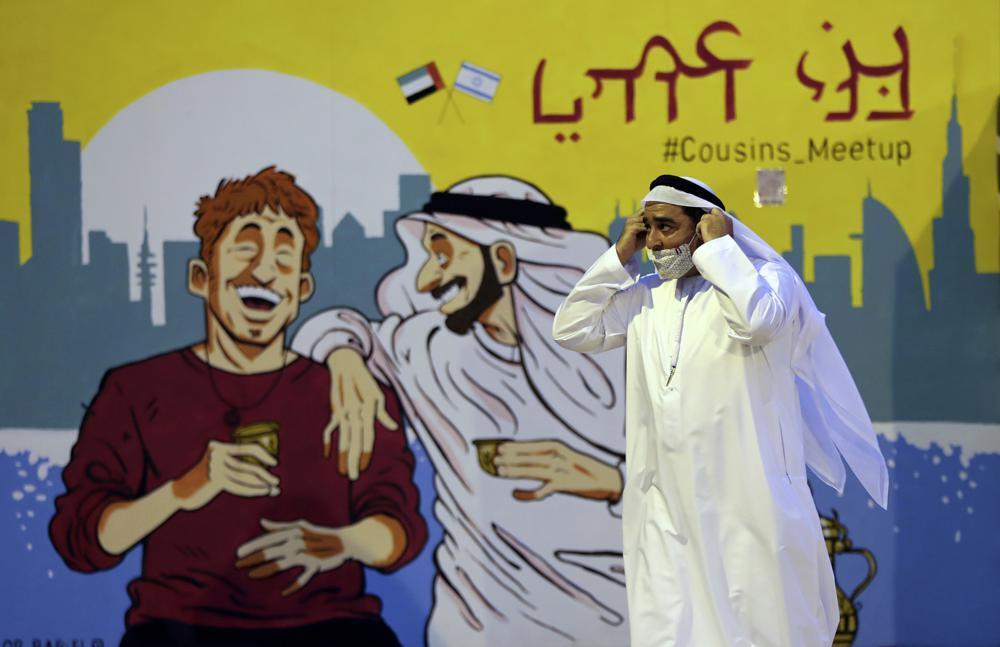The world expected our differences to define us. One of us is a Jew, the other a Muslim. One of us is Israeli, the other Arab. Not only have these characteristics shaped us as human beings, they have also presented an enduring question: Does the past determine the future, or is our fate in our own hands?
This week, with the first-ever official visit by an Israeli minister to the UAE and the opening of an Israeli embassy and consulate in the country, we have an opportunity to reflect on the answer.
4 View gallery


Foreign Minister Yair Lapid and UAE Foreign Minister Sheikh Abdullah bin Zayed meeting in Abu Dhabi on Wednesday
(Photo: EPA / Emirates News Agency)
Fundamentally, the UAE and Israel decided to do things differently with the signing of the historic Abraham Accords in 2020.
With the establishment of diplomatic relations between the UAE and Israel, our two countries set out to determine a new paradigm for our region: one defined by the joint pursuit of peace, stability, security, prosperity and co-existence for our peoples.
Our determination to realize the Accords stems from our recognition that we share many of the same objectives, particularly in our commitment to fostering a better future for generations to come. If we have the opportunity to create a world of peace for them, we must not let this chance pass us by.
4 View gallery


L-R: Then-prime minister Benjamin Netanyahu, UAE Foreign Minister Abdullah bin Zayed Al Nahyan and Bahraini FM Abdullatif bin Rashid Alzayani attend the signing of the Abraham Accords at the White House, Sept. 2020
(Photo: AP)
Certainly, the challenges that lie before us are significant. The peace that our countries have chosen comes against the backdrop of outbreaks of violence and extremism in the region, where serious economic interests and complex diplomatic dynamics exist.
Our approach, which prioritizes open exchange and people-to-people engagement, will need to overcome forces that will try to undermine it. However, we are convinced of the power of bold decision-making that places the welfare of our peoples first, and we hope to continue to inspire others in the region to choose the path towards peace.
The benefits of forging an enduring peace are clear. Since the establishment of relations between the UAE and Israel, economic growth, cultural exchange and political co-operation between our countries have flourished.
We have witnessed high-level trade delegations exploring promising opportunities for trade and investment, including in the healthcare, aviation, agriculture, education, telecommunications, energy, technology and tourism sectors.
4 View gallery


A delegation of Israeli industrialists visiting the UAE, Nov. 2020
(Photo: Manufacturers Association of Israel)
We have seen our countries closely collaborate on vaccine research and development as the UAE and Israel have become world leaders in combatting the Covid-19 pandemic. Now ranking among the top countries with the highest rates of vaccine administration, the UAE and Israel are committed to sharing knowledge and expertise with other countries in efforts to strengthen international co-operation in the fight against Covid-19.
Moreover, our two countries are keen to share resources with each other in fields such as digital transformation, smart cities, cybersecurity and artificial intelligence. Young people will benefit from the growth of these industries, which will enhance social wellbeing, increase economic competitiveness, and ensure that our countries are prepared for the future.
As part of the Accords, the UAE, US and Israel also announced the Abraham Fund. Through this fund, the US International Development Finance Corporation, the UAE, and Israel will mobilize more than $3 billion in private sector-led investment and development initiatives to promote regional economic co-operation and prosperity in the Middle East and beyond. In turn, the initiative will generate unprecedented opportunity for the region’s peoples.
Now, two of the world’s most dynamic and advanced societies have begun to create a linked and powerful engine of progress and opportunity, not just for the UAE and Israel but also for the entire region.
This vision is one we share and cherish. The peoples of the UAE and Israel seek to live in a world where peace abounds. In order to achieve this vision, we must work hard to create opportunities for engagement and encourage others to join these efforts. This pursuit can only be bolstered by multilateral co-operation among countries similarly invested in opting for collaboration over confrontation.
4 View gallery


Ahmed Al Mansuri, founder of Crossroads of Civilization private museum, passes by a painting presenting UAE and Israel friendship at an exhibition in Dubai
(Photo: AP)
While the Abraham Accords were the first of their kind in our region, they represent a future that we believe must become more commonplace: one in which differences are set aside in favor of dialogue. As momentum grows, we are reminded that sometimes the most impactful decisions are those believed to be difficult, if not impossible.
We both want to live in a world where peace is possible. We need to work hard with our peoples and with each other. In order to achieve lasting and sustainable solutions to the issues that our region faces, we will continue to champion the spirit of peace in all efforts to shape a better world for our children. Peace isn't an agreement you sign – it's a way of life. The ceremonies we held this week aren't the end of the road. They are just the beginning.
In doing so – in deciding differently – we choose peace.
Yair Lapid is the Foreign Minister of Israel. Sheikh Abdullah bin Zayed Al Nahyan is the UAE Minister of Foreign Affairs and International Co-operation

